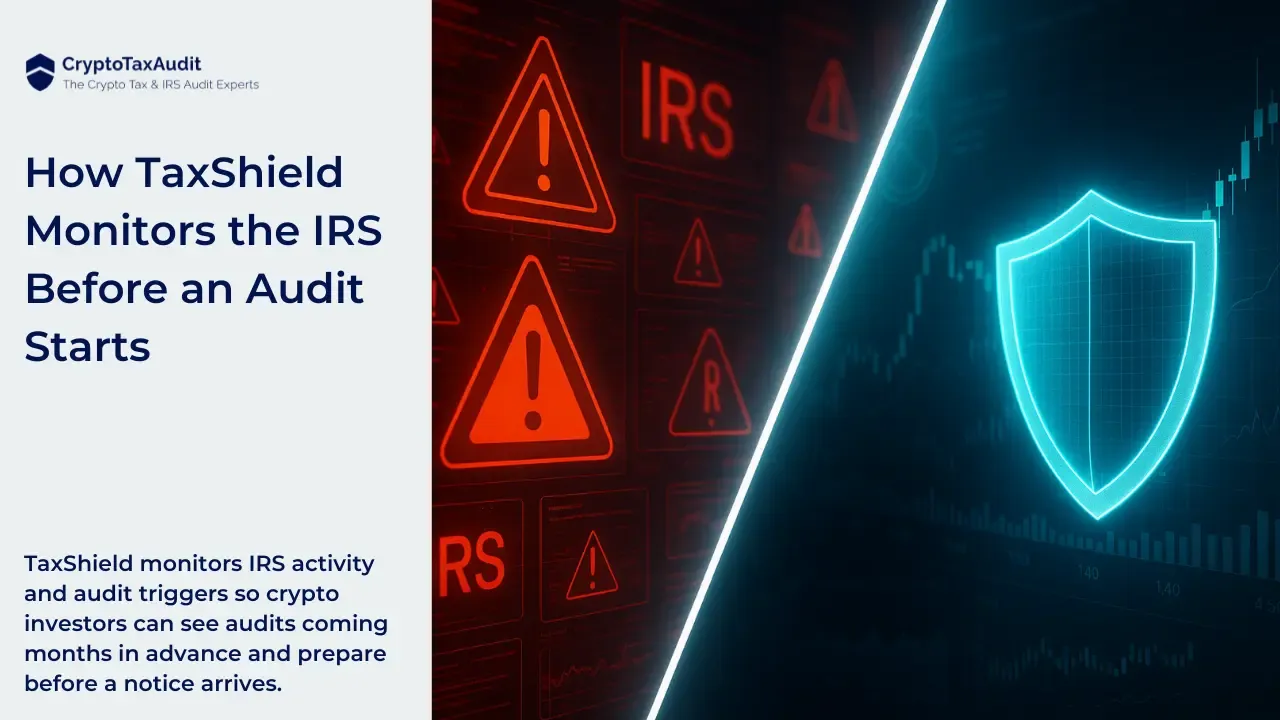
What does it cost to defend yourself against the IRS? If you own cryptos, buckle up!
What does an IRS crypto audit cost?
Some people ask us why audit defense is so expensive. Tax lawyers and people who have been through IRS audits wonder how we can offer it for so little. First, what is an audit and how are people selected? Here are the facts.
What is an audit?
According to the IRS, an audit “is a review/examination of an organization's or individual's accounts and financial information to ensure information is reported correctly according to the tax laws and to verify the reported amount of tax is correct.”
How are people selected for audits?
The IRS says there are two main methods of selection:
- Random selection and computer screening
- Related examinations
The first method is the catch-all, since the IRS doesn’t like to tip its hand and explain how and when people are selected. In the crypto tax world, preparing a “bulletproof” tax return as CryptoTaxAudit does for its clients is a great way to dramatically reduce your risk to near zero. Of course, no one can guarantee you won’t be audited because there is also a “random selection” component.
The second method says that the IRS can select you for an audit if your tax return involves “issues or transactions with other taxpayers, such as business partners or investors, whose returns were selected for audit.” So, be careful who you do business with.
How are you notified?
The IRS uses only one method. If you are selected for an audit (referred to as an “examination”), you will get paper mail sent to your last reported address. Yes, it’s the 21st century and they are still using paper mail. It is what it is.
There are also ways to check your IRS account online. We offer that research and monitoring service in all of our Audit Defense plans, so if you want us to check and monitor your account for audit flags, liens, compliance issues, and more, learn more at CryptoTaxAudit.
Types of audits.
There are two primary audit types.
Correspondence audits.
Most IRS audits are handled simply, by responding to a CP2000, a CP2501, or similar letter. The gist is that oftentimes people haven’t properly accounted for all the income that the IRS knows you received. This can be done by correspondence, by either mail or by fax. (Yes, that fax machine that sits next to your VHS movie collection and your old game of Twister.)
Human audits.
There are also human audits. These are the scary ones. They can take years to complete and can become very, very expensive. Especially if you are a crypto trader or investor.
When you are selected for an audit, the IRS typically selects one year to review. However, they can add additional years to audit if they choose. The IRS will send you a letter giving you 30 days to respond. By the time you receive the physical letter, you may have far less than 30 days.
When the IRS sees cryptos on your return, they smell money. So, your audit becomes a “crypto audit”. What’s worse, if they receive notice from a U.S. crypto exchange that you traded cryptos you haven’t reported, they’ll suspect that you may be hiding cryptos. That gets even more serious.
In their letter, the IRS will propose what they say you owe them in taxes, penalties, and interest. This amount will likely be much higher than your own calculations, even if your did your best to calculate them accurately, but the IRS is right until proven wrong. (Yes, this is where the law considers you guilty and you have to prove your innocence.)
The audit defense timeline.
There are multiple parts to defending yourself in an IRS audit. Here are the major elements and the costs associated.
Hiring expert representation.
First, there are very few professionals that have crypto, tax, and IRS defense experience. Many lawyers don’t know much about cryptos, and many accountants are afraid of liability if they touch a crypto return. Once you do find qualified help, expect to pay $600 per hour. That includes all the time they spend to prepare, negotiate, and resolve your case, including the unbelievable amounts of waiting time on the phone with the IRS.
Responding to the audit.
To do this right, you need to recalculate all your crypto gains for the tax years under audit. This step can be time-consuming and costly, especially if you have hundreds or thousands of crypto transactions. You must also amend your tax returns to include your updated crypto calculations too. If possible, you’ll want to get this updated information to the IRS before they officially start their human audit. Getting it in early can save you up to 40% in additional accuracy penalties. Expect your updated returns to include hundreds of pages in calculations and updates.
Forensic analysis.
You may be surprised by what the IRS already knows about your crypto holdings.
This is probably the most expensive part of all. You’ll want crypto analysts to review, line by line, the IRS calculations looking for accuracy errors. The IRS hires its own analysts to prepare the calculations, so your analysts must be very meticulous. Crypto analysts aren't cheap either. It typically takes about 150 hours of an analyst’s time to work through a complex crypto calculation that may include several thousand transactions.
Negotiating with the auditors.
Since the IRS is tenacious when auditing crypto owners (they can smell the crypto money), you can expect that they won’t back down easily. If you come back with your updated calculations, they make not accept them. That means you’ll need to appeal your case.
Appealing your case.
The appeals process requires more representation time and effort to escalate your case. This requires more out-of-pocket defense costs for you. Don’t worry about the IRS lawyers though, they never run out of money to pay them to go after you!
In the appeals process, each IRS argument needs to be identified and responded to, creating the best case possible for the IRS appeals team to consider. This may work, but the IRS don’t like to look bad. Remember, you are appealing to the IRS itself. The appeals team is in a different department, but you'll need to prepare a compelling argument for them to overrule their own auditors.
Going to tax court.
The final step, one that our team has taken many times for crypto traders, is to present your case to U.S. Tax Court. Here you get an impartial judge, not someone who works for the IRS. And, of course, it costs you more time, energy, and money. You or your representative must attend in person at one of the tax court districts in the United States. Even if you are an expat living abroad, you need to find your way back to the U.S. to get this handled (or get someone who's certified to represent you in tax court).
To properly defend yourself, you need documentation — lots of it. You also need experience. Expert crypto tax defense is hard to find, but it exists. You'll want a crypto tax "expert witness" to defend you in court. Because these folks are few and far between, they’re expensive. Plus, you need to pay travel costs to get them to court including air travel, hotel, meals, and related costs.
Summarizing your costs.
We’ve assembled a table outlining the costs for a full three-year audit that includes a substantial amount of crypto transactions and the need to go all the way to tax court. Note that this process goes slowly, taking up to three years of your time and energy. The IRS isn’t in a rush. They want to see you sweat. They're hoping that you may even give up and give in to their demands.
One more thing. If you don't respond in a timely manner and they think you owe them more than $50,000, they can revoke your U.S. passport without a court order, keeping you grounded and close-to-home until the multi-year process is complete.

In this example, it could cost over $200,000 in total representation costs. It's almost unbelievable.
What can you do?
You can put away up to $200,000 for a potential IRS audit defense fund. Or, you can join our IRS Guard Dog membership. We have plans for every crypto trader and for every crypto budget, from full protection to monitoring-only plans.
Now that you made the leap into cryptos, you need to defend your crypto wealth. It's the cost of doing business.
You wouldn’t drive your car without insurance. Don’t forget to protect your crypto too.
DISCLAIMER: Opinions and perspectives of the author, host, and guests. It should not be construed as U.S. taxpayer advice. There are often multiple interpretations of tax law. Various strategies may be suited to specific individuals and for particular situations. Seek out professional tax, legal, or financial advice from CryptoTaxAudit or from other reputable companies.





